
 Flash News
Flash News
Drenova prison police officer arrested for bringing drugs and illegal items into cell
Lavrov: NATO is risking self-destruction with new military budget
Kurti and Vučić "face off" tomorrow in Skopje
Construction worker dies after falling from scaffolding in Berat
The prosecution sends two Korça Municipality officials to trial

As fighting in Gaza resumes, Americans are increasingly divided over who to blame and what they think the United States should do about a war that has killed more than 1,200 Israelis and 16,000 Palestinians.
"Polls show that Americans feel slightly more pity for Israel than they do for the Palestinians," says Robert Collins, professor of Urban Studies and Public Policy at Dillard University in New Orleans. "But the difference is not very big. Likewise, there are many undecideds and people who are unsure of what they think," he adds.
According to a poll conducted from November 25 to 27 by The Economist magazine and the British research organization YouGov, 38% of Americans feel sorry for the Israelis, while 11% of respondents side with the Palestinians. Twenty-eight percent said they felt the same way about both sides, while 23 percent said they weren't sure what they thought.
This indecision, says Mr Collins, is rooted in the complexity of the conflict.
"Foreign wars are much more complicated to understand than domestic politics," he told VOA. "Because of the fog of war, we are limited in the information we can get, and even a lot of it turns out to be false a day or two later."
Although more than half of respondents did not choose one side or the other, many had strong feelings.
"Of course I'm on Israel's side," says Indiana attorney Jeff Williams. “They allowed the Palestinians and Hamas to live peacefully until they were attacked and their residents were raped and killed. Israel has the right to respond in self-defense."
Internally displaced
The same certainty is observed among those who feel sorry for the Palestinians.
“As the mother of a son who is part Palestinian, I feel a moral obligation to speak out for those in Gaza who are being killed, beaten, kidnapped and unjustly arrested by Israel, simply for existing. I don't understand how so many Americans support those who commit these kinds of horrors," said Louisiana graduate student Brooklyn Birdie.
Rachel Lacombe manages a nonprofit organization in Pennsylvania. She says she feels sad for the Israeli citizens who were killed during the October 7 attack by the militant group Hamas.
"But in my heart I feel pity for the Palestinian people, who have been robbed of their homes for seven decades, displaced and forced to stay in refugee camps on their land, since 1948, when Israel was founded," she says to the Voice of America.
Ms. Lacombe says that's a view that's hard to say out loud in today's America.
“Ka qenë e tmerrshme të shikosh qindra të akuzuar për antisemitizëm, të humbasin punën, sulmuar në internet apo futur në ‘listën e zezë’ vetëm se kanë qenë kritikë ndaj politikave të Izraelit. Edhe unë duhet të jem e kujdesshme mbi atë çka them”, thotë ajo.
Një betejë për ekzistencën e izraelitëve
“Mendoj se është diskriminuese të thuash se ky konflikt filloi në vitin 1948, për shkak se hebrenjtë pushtuar tokën që është tashmë Izraeli për pjesën më të madhe të mijëra viteve përpara kësaj”, thotë nëna nga Konektikat, Rebecca Urrutia. “Unë lutem edhe për palestinezët e pafajshëm, por mbështes pikë së pari dhe mbi të gjitha Izraelin. Ata po mbrojnë tokën dhe popullin e tyre dhe kanë qenë objektiv i kaq shumë sulmeve në të kaluarën”.
Një arsye përse amerikanët ka më shumë gjasa të mbështesin Izraelin janë dekadat e aleancës gjeopolitike mes Shteteve të Bashkuara dhe Izraelit. Një tjetër arsye mund të jetë se ka më shumë amerikanë hebrenj sesa amerikanë myslimanë.
Sipas Institutit të Studimeve Sociale Steinhardt në Universitetin Brandeis, amerikanët hebrenj përbëjnë rreth 2.4% e popullsisë së Shteteve të Bashkuara, ndërsa Qendra Kërkimore Pew thotë se amerikanët myslimanë përbëjnë rreth 1% e popullsisë.
Që nga 7 tetori, sipas një studimi të Institutit të Elektoratit Hebre, është rritur numri i amerikanëve hebrenj që thonë se ndihen të lidhur emocionalisht me Izraelin.
“Mendoj se komuniteti hebre ishte i ndarë që nga presidenca Trump, por sulmet e 7 tetorit na bashkuan”, tha Lisa Peicott, nga sinagoga e Los Anxhelosit. “Qindra mijëra prej nesh janë bashkuar për të marshuar dhe për të demonstruar kundër antisemitizmit dhe në favor të Izraelit”.
Megjithëse anketimet tregojnë se amerikanët ka më shumë gjasa të mbështesin Izraelin, një numër i madh personash që u pyetën gjatë anketimit të bërë nga NPR/PBS NewsHour/Marist, thanë se përgjigja e Izraelit ishte e tepruar. Megjithëse vetëm 26% besonin kështu në 11 tetor, katër javë më vonë ky numër arriti në 38% të të anketuarve.
“Nga njëra anë ndjehem e trazuar dhe ndjej dhimbje kur disa amerikanë – përfshirë aktivistë liberalë dhe udhëheqës që i pata respektuar – tashmë e injorojnë, e festojnë apo madje edhe e mohojnë dhunën, përdhunimet dhe vdekjet e hebrenjve”, tha Sophie Teitelbaum, mësuese në Los Anxhelos. “Kjo është padije dhe është antisemite”.
Nga ana tjetër, zonja Teitelbaum tha se ajo vetë e kritikon qeverinë e Izraelit, drejtuesit e tij dhe përgjigjen ushtarake në Gazë.
“E kuptoj nevojën për t’u mbrojtur, por gjithashtu mendoj se përgjigja e Izraelit ishte çnjerëzore, joetike dhe e gabuar”, i tha ajo Zërit të Amerikës. “Të dyja palët po vuajnë. Të dyja palët kanë pretendime historike ndaj asaj toke. Të dyja palët janë të frikësuara dhe meritojnë të mund të jetojnë në paqe. Por thjesht pasi unë nuk zgjedh njërën palë, rrezikohem të përjashtohem nga të dyja”.
Muzikantja nga Minnesota, Joanna Miller ka të njëjtën frikë.
"I have friends who have strong feelings on both sides, and I don't want to upset either of them," she said. "But even if you don't say anything it can be a problem. I have some Jewish friends on social media who compare us to Nazis for not saying something."
This campaign against silence is coming from both sides of the debate and is forcing some Americans to voice opinions they might feel better about not expressing./VOA
Latest news


Second hearing on the protected areas law, Zhupa: Unconstitutional and dangerous
2025-06-30 22:18:46



Israel-Iran conflict, Bushati: Albanians should be concerned
2025-06-30 21:32:42

Fuga: Journalism in Albania today in severe crisis
2025-06-30 21:07:11
"There is no room for panic"/ Moore: Serbia does not dare to attack Kosovo!
2025-06-30 20:49:53

Temperatures above 40 degrees, France closes nuclear plants and schools
2025-06-30 20:28:42
Lavrov: NATO is risking self-destruction with new military budget
2025-06-30 20:13:54
Turkey against the "Bektashi state" in Albania: Give up this idea!
2025-06-30 20:03:24

Accused of sexual abuse, producer Diddy awaits court decision
2025-06-30 19:40:44



Kurti and Vučić "face off" tomorrow in Skopje
2025-06-30 18:44:12
Tourism: new season, old problems
2025-06-30 18:27:23


Construction worker dies after falling from scaffolding in Berat
2025-06-30 17:51:44




Almost free housing: East Germany against depopulation
2025-06-30 16:43:06

Hamas says nearly 60 people killed in Gaza as Trump calls for ceasefire
2025-06-30 16:14:15
Drownings on beaches/ Expert Softa: Negligence and incompetence by institutions!
2025-06-30 16:00:03


European ports are overloaded due to Trump tariffs
2025-06-30 15:30:44
The prosecution sends two Korça Municipality officials to trial
2025-06-30 15:19:54

Lezha/ Police impose 3165 administrative measures, handcuff 19 drivers
2025-06-30 14:55:04
Young people leave Albania in search of a more sustainable future
2025-06-30 14:47:52
Record-breaking summer, health threats and preventive measures
2025-06-30 14:36:19


Constitution of the Parliament, Osmani invites political leaders to a meeting
2025-06-30 14:07:54

Heat wave 'invades' Europe, Spain records temperatures up to 46 degrees Celsius
2025-06-30 13:42:02
Accident in Vlora, car hits 2 tourists
2025-06-30 13:32:16

Kurti confirms participation in today's official dinner in Skopje
2025-06-30 13:03:27

Fight between 4 minors in Kosovo, one of them injured with a knife
2025-06-30 12:38:45

Report: Teenage girls the loneliest in the world
2025-06-30 12:20:40
Commissioner Kos and Balkan leaders meet in Skopje on Growth Plan
2025-06-30 12:07:59
Wanted by Italy, member of a criminal organization captured in Fier
2025-06-30 11:55:53
Hundreds of families displaced by wave of Israeli airstrikes in Gaza
2025-06-30 11:45:17
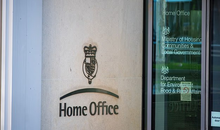
Zenel Beshi: The criminal who even 50 convictions won't move from Britain
2025-06-30 11:23:19
A new variant of Covid will circulate during the summer, here are the symptoms
2025-06-30 11:14:58

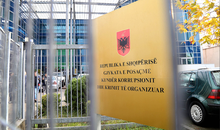
"Partizani" case, trial postponed to July 21 at the Special Court
2025-06-30 10:41:05
Uncontrolled desire to steal, what is kleptomania, why is it caused
2025-06-30 10:30:08
Requested change of security measure, hearing for Malltez postponed to July 7
2025-06-30 10:24:32


Output per working hour in Albania 35% lower than the regional average
2025-06-30 09:54:35

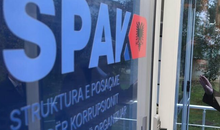
The trial for the "Partizani" file begins today
2025-06-30 09:27:57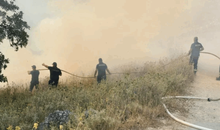
22 fires in the last 24 hours in the country, 2 still active
2025-06-30 09:21:28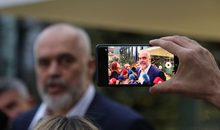
How is the media controlled? The 'Rama' case and government propaganda
2025-06-30 09:13:36
German top diplomat: Putin wants Ukraine to capitulate
2025-06-30 09:00:07
Foreign exchange, how much foreign currencies are sold and bought today
2025-06-30 08:44:38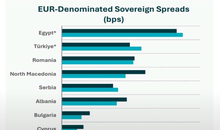
Chart/ Sovereign risk for Albania from international markets drops significantly
2025-06-30 08:26:38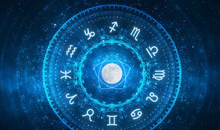
Horoscope, what do the stars have in store for you?
2025-06-30 08:11:44
Clear weather and passing clouds, here is the forecast for this Monday
2025-06-30 07:59:32
Morning Post/ In 2 lines: What mattered yesterday in Albania
2025-06-30 07:47:37
Milan make official two departures in attack
2025-06-29 21:57:23
6 record tone
2025-06-29 21:30:46
4-year-old girl falls from balcony in Lezha, urgently taken to Trauma
2025-06-29 21:09:58


Assets worth 12 million euros seized from cocaine trafficking organization
2025-06-29 19:39:43
Fire in Durrës, Blushi: The state exists only on paper
2025-06-29 19:17:48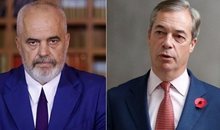

Fire endangers homes in Vlora, helicopter intervention begins
2025-06-29 18:27:51
France implements smoking ban on beaches and parks
2025-06-29 18:02:08
England U-21 beat Germany to become European champions
2025-06-29 17:42:49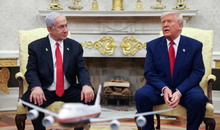
Trump criticizes Israeli prosecutors over Netanyahu's corruption trial
2025-06-29 17:08:10
Street market in Durrës engulfed in flames
2025-06-29 16:52:57

UN nuclear chief: Iran could resume uranium enrichment within months
2025-06-29 16:03:24
Albanian man dies after falling from cliff while climbing mountain in Italy
2025-06-29 15:52:01

Another accident with a single-track vehicle in Tirana, a car hits a 17-year-old
2025-06-29 15:07:15
While bathing in the sea, a vacationer in Durrës dies
2025-06-29 14:54:01
Sentenced to life imprisonment, cell phone found in Laert Haxhiu's cell
2025-06-29 14:26:40
77 people detained in protest, Vučić warns of new arrests
2025-06-29 14:07:46

From a hospital for children to a prison for politicians
2025-06-29 13:34:02
